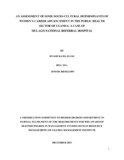| dc.contributor.author | BYAMUKAMA, ELIAS | |
| dc.date.accessioned | 2019-09-05T11:55:49Z | |
| dc.date.available | 2019-09-05T11:55:49Z | |
| dc.date.issued | 2013-12 | |
| dc.identifier.citation | Byamukama Elias (2013) An Assessment of some Socio- cultural determinants of Women's career advancement in the Public Health Sector in Uganda. A case of Mulago National Referral hospital | en_US |
| dc.identifier.uri | https://hdl.handle.net/20.500.12305/501 | |
| dc.description.abstract | The general objective of this study was to assess how some socio-cultural factors affected women’s career advancement in Uganda’s public health sector showcasing Mulago National Referral Hospital (MNRH). To achieve this objective, the following specific objectives were developed: i) To establish if family and work life balance had shaped and influenced women’s career advancement trajectory in MNRH, and, ii) To assess the extent to which gender prejudice had accentuated gender inequalities in career advancement in MNRH. The researcher collected data from 89 participants (50 females and 39 males) employees of MNRH who were categorized into four managerial levels: Oversight/strategic level, senior management level; operational/middle management level and lower/support management level. Simple random sampling method was used to select appropriate respondents while purposive sampling was used to select key informants. Data was coded, edited, before classifying it into categories and entered into the statistical package for social scientists (SPSS) for analysis. Analyzed outputs included simple frequency, cross tabulations and correlations which formed the basis for analysis in addition to data from key informants.
The study established that family and work balance conflicts and women’s career advancement were insignificantly related (rho = 0.043; p> 0.05 (= 0.686), and gender stereotypes and career advancement of women were insignificantly related (rho = 0.0187; p>0.05(= 0.079). The conclusions were that family-work balance complexity and gender stereotypes did not affect career advancement of women. From the above findings, the study recommended that the Mulago hospital management should design a system that gives women progressively more responsibilities and change the system that confines women to only support roles or jobs that require soft skills, and that MNRH management should design a system that qualitatively evaluates women’s contribution and drop the system that only relies on one’s ability to put in extra hours beyond regular work hours in order to be promoted. | en_US |
| dc.language.iso | en | en_US |
| dc.publisher | Uganda Management Institute | en_US |
| dc.subject | Assessment | en_US |
| dc.subject | Socio- Cultural Determinants | en_US |
| dc.subject | women's Career Advancement | en_US |
| dc.subject | Public Health Sector | en_US |
| dc.subject | Uganda | en_US |
| dc.title | AN ASSESSMENT OF SOME SOCIO-CULTURAL DETERMINANTS OF WOMEN’S CAREER ADVANCEMENT IN THE PUBLIC HEALTH SECTOR OF UGANDA: A CASE OF MULAGO NATIONAL REFERRAL HOSPITAL | en_US |
| dc.type | Thesis | en_US |

